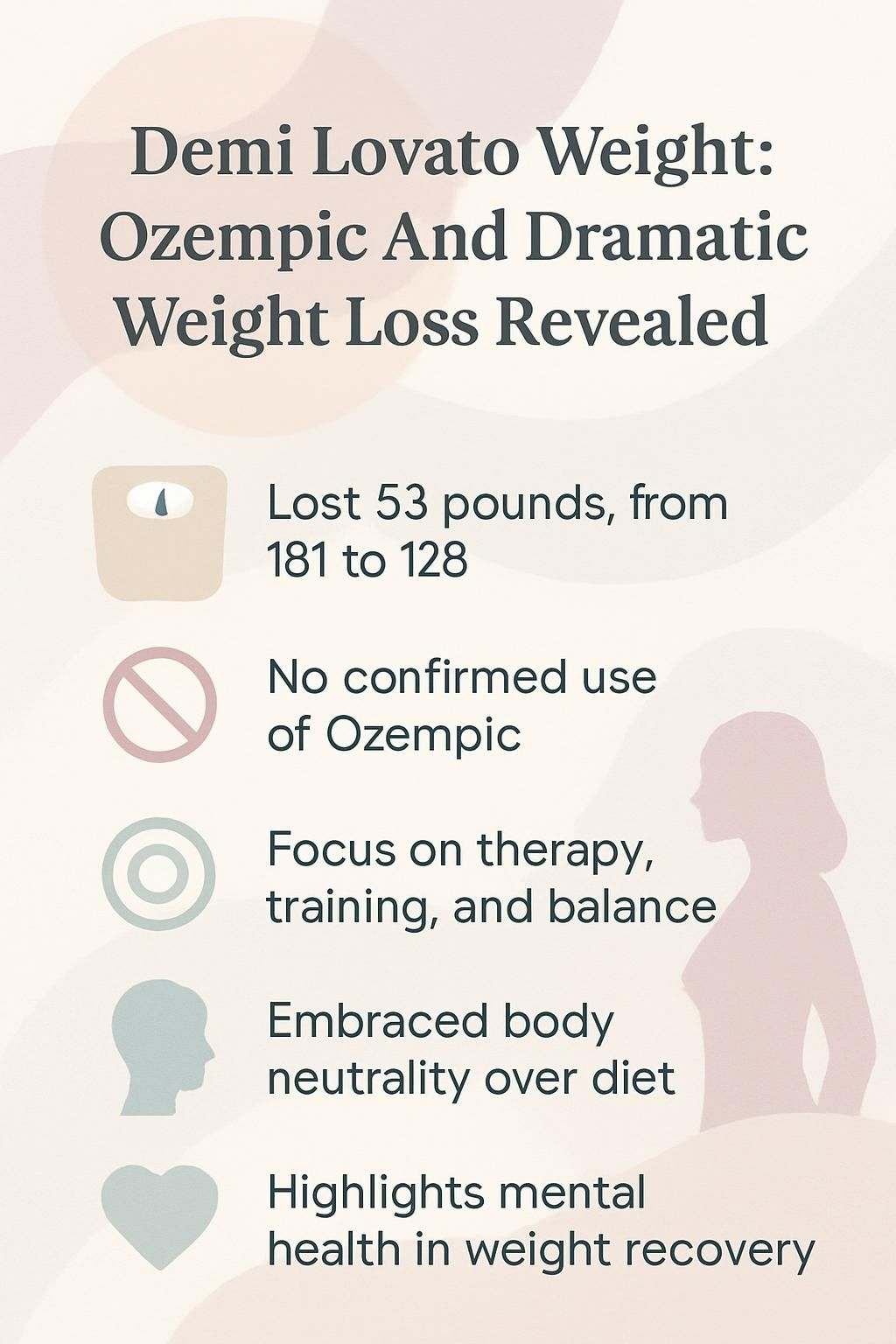Demi Lovato Weight: Ozempic And Dramatic Weight Loss Revealed
Our Nutrition Assistant AI Suite will transform your body. You will lose fat, get toned, and build muscle. Gain confidence and optimal health.
You may feel curious or confused about Demi Lovato weight and the rumors about dramatic changes. Over the years, Demi Lovato has faced constant public talk about body image, mental health, and her recent look. These topics can get messy fast.
This article gives you clear facts about her weight loss journey and the debate around Ozempic. You will also see how she speaks about body acceptance and recovery. The goal is to help you look at health with a kinder, more balanced view.
Keep reading to separate real details from headlines and guesswork.
Key Takeaways
- Public reporting says Demi Lovato lost about 53 pounds, from roughly 181 lbs to 128 lbs, while focusing on recovery, therapy, strength training, and balanced eating rather than strict calorie limits.
- There is no confirmed evidence that Demi Lovato used Ozempic, also called semaglutide, for weight loss. She has not made a public statement linking the drug to her changes.
- Since at least March 2021, Demi has worked with nutrition and therapy professionals, stepping away from diet culture and toward self-compassion and body acceptance.
- Many social media posts support her shift to body neutrality and holistic health instead of chasing fast diet trends or narrow beauty standards.
- Her story highlights how mental health care, alongside physical habits, supports sustainable weight management and recovery from eating disorders.

Demi Lovato’s Weight Loss Journey

Demi Lovato stuns fans with a visible transformation, often seen on Instagram. Her journey centers on recovery and body acceptance, a reset that leaves diet culture behind.
How did Demi Lovato struggle with body image and eating disorders?
Demi has been open about long battles with body image and an eating disorder called bulimia nervosa. Bulimia involves cycles of binge eating followed by purging, such as vomiting or over-exercising. These patterns can damage health and raise stress.
Her weight reportedly peaked near 181 lbs during difficult periods. Daily life became tied to the scale, not well-being. Negative self-talk grew stronger, which fed more restrictive habits and more shame.
On Instagram, she shared her work to step away from diet culture, stop restricting, and stop purging. She began to rebuild both physical strength and mental health with help from a nutritionist and a therapist.
How did Demi transition to a healthier lifestyle?
Demi made key changes that put mental and emotional health first. In March 2021 she said on Instagram, “I don’t count calories anymore. I don’t over exercise anymore. I don’t restrict or purge.” That shift moved the focus from a slimmer physique to long-term health and self-respect.
She stopped weighing herself and let go of strict calorie tracking. Weight loss became a side effect of living with more care and less control. To support that shift, she added strength training, reduced processed sugar and refined carbs, and practiced mindful eating.
With a nutritionist and a therapist, she worked to stay in recovery from bulimia. Therapy and honest self-reflection became weekly habits. This approach helped her value her body for strength and function.
“I’ve actually lost weight, but for the first time in my life, I don’t count calories, I don’t over exercise, and I don’t restrict or purge. I can honestly say I feel full of life.”
The Role of Ozempic in Her Transformation
Ozempic, the brand name for semaglutide, is often discussed in celebrity weight stories. With headlines swirling, it helps to know what the medicine does and what is confirmed about Demi.
What is Ozempic?
Ozempic is a prescription medicine for type 2 diabetes. Its drug, semaglutide, is a GLP-1 receptor agonist. That means it mimics a gut hormone that helps control blood sugar and can reduce appetite. Some versions of semaglutide are also FDA approved for chronic weight management in adults with obesity or overweight and certain health risks.
- How it works: helps regulate blood sugar, slows stomach emptying, and may lower appetite [1].
- Clinical results: a 2021 trial of semaglutide for weight management showed an average weight loss near 15 percent with lifestyle support [2].
- Common side effects: nausea, vomiting, diarrhea, constipation, and possible risk of gallbladder issues [1].
- Who it is for: only for people who meet medical criteria and under a licensed clinician’s care.
Medicine is not a shortcut. It is one tool that may help some adults alongside nutrition, movement, sleep, and therapy.
Is Ozempic linked to Demi Lovato’s weight loss?
There is no verified proof that Demi used Ozempic for weight loss. Rumors appear online, but there are no on-the-record statements or medical confirmations that link the drug to her transformation.
Public discussion of her changes centers on recovery, therapy, strength training, and balanced eating. Claims about Ozempic remain speculation. If you are considering any medicine, talk with a licensed clinician who knows your health history.
Key Aspects of Demi Lovato’s Transformation
Her reported progress shows a full-body approach, not a single hack. Think steady steps, not a miracle fix.
How did Demi lose 53 pounds, going from 181 lbs to 128 lbs?
Reports say Demi lost about 53 pounds after shifting her mindset and daily habits. She stopped counting calories and moved away from marathon workouts. Strength training became a base, which can support metabolism and confidence.
Food choices leaned toward whole foods and higher protein, with fewer processed sugars and refined carbs. Mindful eating helped her notice hunger and fullness signals without rigid rules. Weight loss followed as a byproduct, not the main goal.
Her updates on Instagram stress that building strength can feel steady even when body image changes day to day. Professional support guided her through the process.
How does Demi focus on body acceptance and recovery?
Demi has talked about shifting from self-criticism to self-compassion. Body acceptance means valuing your body for what it does, even when you do not love every part in the mirror. This idea is often called body neutrality.
Recovery remains the priority. Her treatment team supports both mental and emotional health so shame does not drive choices. This mindset helps remove guilt around food and appearance. It also supports long-term habits instead of short sprints.
How does Demi incorporate nutrition and therapy into her routine?
Her approach uses a high-protein, whole foods pattern. That means lean meats or plant proteins, vegetables, fruits, whole grains, nuts, and seeds. She also cut back on processed sugars and refined carbohydrates to support steady energy.
Mindful eating plays a role. You slow down, notice taste and fullness, and step away from harsh rules. Regular therapy sessions help with stress, self-talk, and relapse prevention. Many people find this mix improves both mood and metabolism.
The Impact of Diet and Exercise
Demi now shares how balanced eating and measured training help her live her life on her terms. A team approach supports recovery and reduces pressure from diet culture.
How is Demi shifting away from diet culture?
Diet culture is the idea that thinness equals health and worth. Demi stopped counting calories and dropped over-exercising. The scale no longer sets the tone for the day or drives choices.
She focuses on well-being first. That includes self-compassion, listening to hunger and fullness cues, and dropping rules that label foods as “good” or “bad.” Professional guidance helps her keep recovery central and health broader than any number.
What balanced eating habits does Demi embrace?
Mindful eating anchors each meal. She listens to hunger and fullness cues instead of strict plans. Her plate often includes protein, fiber-rich produce, and healthy fats. These choices can reduce blood sugar swings and support stable energy.
She avoids harsh labels like “cheat” or “clean.” That language can build shame and binge-restrict cycles. Small, repeatable habits move the needle more than extreme plans. Working with a trained nutrition professional can help you tailor a plan that fits your life.
How does Demi moderate her exercise routines?
Strength training appears to be the base of her routine. Instead of chasing long, punishing sessions, she aims for steady progress and recovery days. The goal is building capacity, not burning off calories from guilt.
Moderation supports both mental well-being and physical results. Many people feel stronger, sleep better, and manage stress more easily with this approach.
Demi’s Journey to Body Neutrality
Body neutrality is like taking a deep breath. You do not have to celebrate your looks every day to respect your body.
What does moving beyond body positivity mean for Demi?
Moving beyond body positivity means you are not required to praise your appearance daily. Instead, you focus on how your body functions. You can value resilience, recovery, and health even on days when self-love feels tricky.
With support from professionals, recovery becomes the goal. Self-worth grows from inner strength, not likes or comments. This mindset accepts that some days are hard. You can still care for your body on those days.
How does Demi appreciate her body for its strength?
Demi often credits strength work for her confidence. Training highlights what the body can do, like lifting more or mastering a new move. That shift, from appearance to ability, changes the tone in the mirror.
Focusing on function helps reduce pressure to meet narrow beauty standards. Progress becomes about skills and health, not only size.
Social Media Reactions to Her Transformation
Fans have reacted in big numbers, and their comments reflect changing views on health and body image.
What are fans saying about Demi’s transformation?
Many posts praise Demi for honesty about body image and eating disorders. Supporters say she seems more confident in interviews and live shows. They also highlight her message about recovery and self-compassion.
Fans often mention her statements like “I’ve been in recovery” and note the help from her treatment team. Some share that her story gave them courage to ask for help or drop painful diet rules.
How is the public discussing body image and health?
Conversations now include body positivity, body neutrality, and body acceptance. People point to Demi as an example of caring for mental and physical health at the same time. That mix supports long-term change.
Many posts challenge diet culture. They stress help from trained professionals, balanced eating, regular therapy, and practical movement. Health becomes a wider goal than a number on a scale.
The Role of Professionals in Her Recovery
Recovery often works best with a strong support team. Education, structure, and accountability make a real difference.
How have nutritionists and therapists supported Demi?
Nutrition professionals guided her toward a higher protein, whole foods pattern without rigid rules. That shift reduced restriction and helped rebuild trust with food. It also supported energy and training.
Therapists addressed the thoughts and feelings that fuel disordered eating. With steady care, she built self-compassion and healthier coping skills. Ongoing support helped her maintain new habits and protect recovery.
How did Demi overcome bulimia and substance use?
Demi’s recovery from bulimia and substance use appears to be holistic. Therapy helped her challenge distorted thoughts and spot triggers early. Nutrition support rebuilt structure and reduced fear around food.
Community and support groups added connection and accountability. Over time, she practiced new coping skills in real life. Recovery takes time and help, and her progress shows that change is possible with the right tools.
Lessons from Demi Lovato’s Journey
Her experience shows that caring for your mind and body together can change the path forward.
Why are mental and physical health important according to Demi’s journey?
Both matter because they feed each other. Therapy, sleep, and stress care support your mind. Balanced meals and moderate exercise support your body. Combining these habits raises energy, steadies mood, and improves resilience.
She reportedly lost 53 pounds, yet her message keeps pointing to mental health as the anchor. When shame fades and support grows, steady habits get easier to maintain.
How has Demi broken free from societal beauty standards?
She stepped away from the idea that thinness equals worth. Instead, she chose body acceptance and self-care. Strength, recovery, and health guide her choices now.
This perspective invites you to care less about external pressure and more about how you feel and function. It also encourages you to reject harsh rules and seek support that fits your life.
Conclusion
Demi Lovato’s story shows a weight loss journey that focuses on recovery, body acceptance, and support from professionals. Ozempic often gets mentioned in headlines, but there is no confirmed link to her transformation. The consistent themes are therapy, strength training, and balanced eating.
If you are exploring similar changes, start with your health team and skip quick fixes. Medicines like semaglutide have real uses and real risks [1][2]. Get medical advice that fits your history, then build habits you can keep. Your goal is a kinder relationship with food, movement, and your body.
Health information in this article is for education only. It does not replace personalized care from a licensed clinician.
[1] U.S. FDA Prescribing Information for semaglutide products, including approved uses and safety details. [2] Wilding JPH et al., 2021, New England Journal of Medicine, semaglutide for weight management trial results.
FAQs
1. What led to Demi Lovato’s recent weight loss and is Ozempic involved?
Demi Lovato’s recent weight loss has sparked public interest, with some reports suggesting the use of Ozempic, a medication approved for type 2 diabetes and sometimes prescribed off-label for weight management. No direct confirmation from Lovato or her medical team exists regarding Ozempic use. According to the National Institutes of Health, medications like Ozempic can support weight loss when combined with diet and exercise.
2. How does Ozempic work for weight management?
Ozempic contains semaglutide, which mimics a hormone that targets areas in the brain involved in appetite regulation. Clinical studies show that people using semaglutide lost an average of 10-15 percent of their body weight over several months when paired with lifestyle changes (Wilding et al., 2021). The medication is administered as a weekly injection.
3. Are there risks or side effects linked to Ozempic?
Ozempic may cause side effects such as nausea, vomiting, diarrhea, or constipation. Rare but serious risks include pancreatitis and gallbladder problems as noted by the Food and Drug Administration (FDA). People considering Ozempic should consult a healthcare provider to discuss benefits and potential complications.
4. What healthy strategies did Demi Lovato mention regarding her weight journey?
Demi Lovato has spoken about focusing on self-care rather than strict dieting or rapid results. She emphasizes mental health support along with balanced nutrition and physical activity as part of her approach to wellness. This perspective aligns with recommendations from registered dietitians who stress sustainable habits over quick fixes.
Summary: Demi Lovato’s dramatic weight change has drawn attention due to speculation about medications like Ozempic; however, no official statement confirms its use in her case. Ozempic works by regulating appetite but carries possible side effects that require medical supervision. Lovato highlights holistic health practices including emotional well-being alongside nutrition and exercise as key factors in her personal experience with weight management.







